A spiritual coach guides people in setting and achieving goals. Unlike regular life coaches, they focus on the deeper spiritual parts of life. They provide direction, encouragement, and accountability for anyone seeking meaningful change or wanting a closer bond with their own spirit.
If you are curious to know how to become a spiritual coach, then this article will help you to do so.
To become a spiritual coach, you must choose a specific niche, develop a clear vision, build your coaching package, and earn a certification.
You will also need to choose platforms like EzyCourse to host your courses and coaching services. After creating the coaching packages, reach out to your clients and communicate clearly with them to enroll them in your spiritual coaching sessions.
Keep reading to learn the secrets of becoming a spiritual coach and launching your own coaching platform.
What Is A Spiritual Coach?

A spiritual coach is someone who helps people deepen their self-awareness and move past negative thought patterns. This work often involves one-on-one or group sessions. A spiritual coach helps clients learn to practice self-love and gain a clearer sense of their purpose.
What a Spiritual Coach Does?
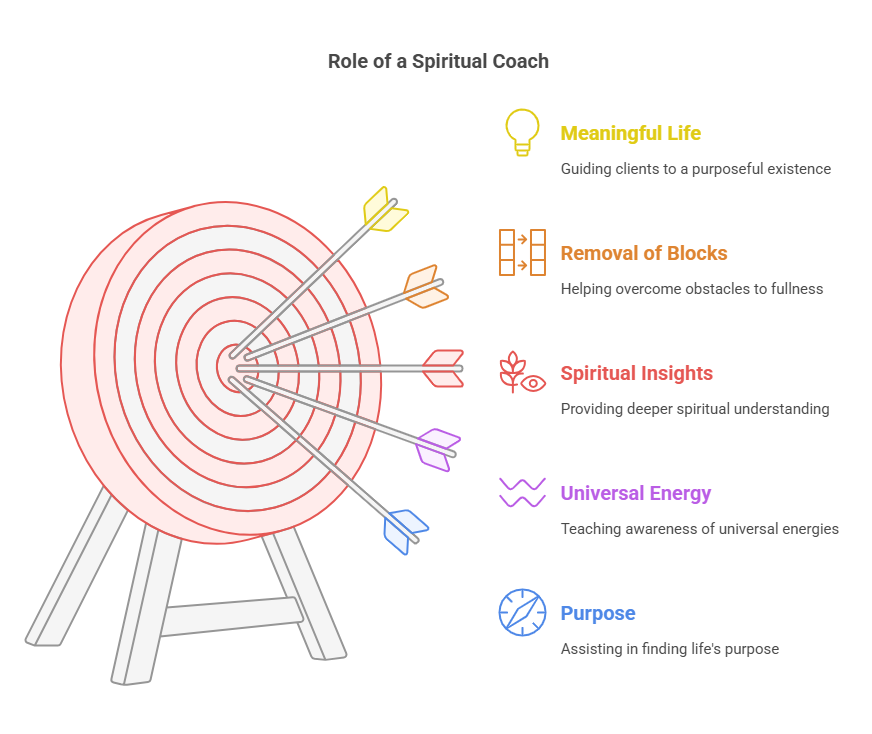
Before knowing how to become a spiritual coach, you need to know what a spiritual coach does.
A spiritual coach helps people find purpose in life. They also show clients how to sense and understand universal energy. Moreover, they reveal deeper spiritual truths that spark self-awareness and growth. They teach self-love, compassion, and gratitude.
The coach also helps remove blocks that keep people from living fully. Often, this approach goes beyond typical life coaching by focusing on spiritual insight. In short, they guide learners toward a more meaningful life of purpose.
Who Can Become a Spiritual Coach?
Anyone with genuine experience in guiding others can step into spiritual coaching. You need practical skills and proof that you can help people.
Maybe you once led a congregation, and now you want to serve as a coach. Or perhaps you’ve practiced energy healing on friends, and they’ve seen positive results. If you have these qualities, you can step in with your proven experience to become a spiritual coach.
Below are a few checklists that you can check before becoming a spiritual coach:
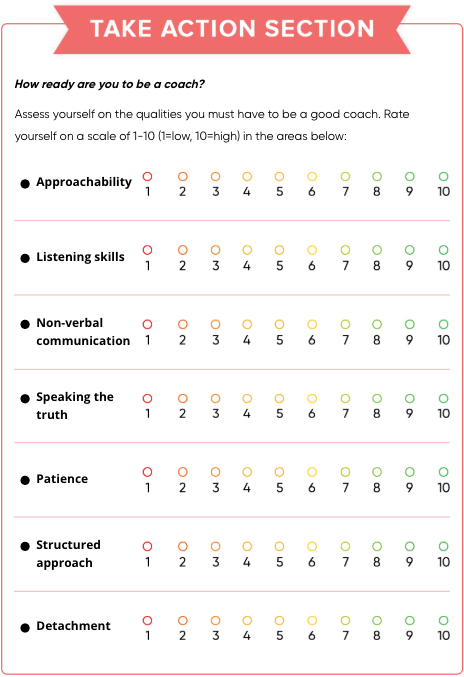
Do You Need a Certification to Be a Spiritual Life Coach?
Many people ask this. Specific health-focused coaching fields do require certifications, but spiritual coaching is optional. Some coaches start right away by offering lower rates to gain practice.
Others prefer a structured approach through recognized courses at places like the Certified Life Coach Institute, The Institute for Life Coach Training, or The Coaching and Positive Psychology (CaPP) Institute. If you decide to get certified, you should choose an accredited program.
Once you settle on your path, you’ll be ready to set up your coaching business.
How to Become A Spiritual Coach?
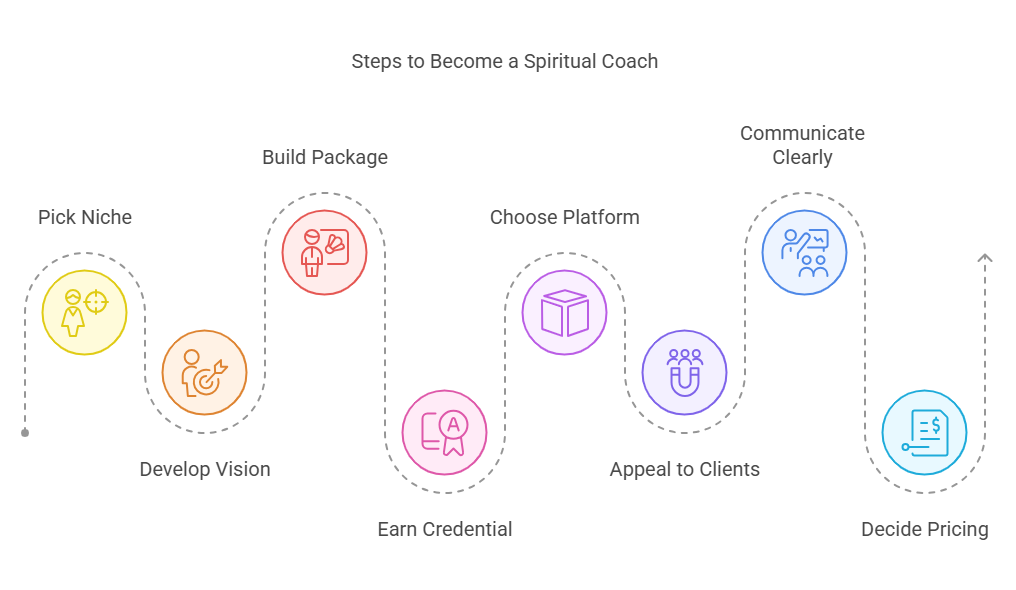
The easy steps to become a spiritual coach are the following:
1. Pick Your Spiritual Coaching Niche
You can serve everyone as a general spiritual coach. But you’ll appeal more to your perfect clients if you specialize.
Assume you’re a financial coach. If someone needs help with retirement, they’d likely pick a coach who specializes in retirement planning rather than a broad financial advisor. The same logic applies to the spiritual coaching business.
You can choose your focus by age group, a specific faith, or a distinct spiritual goal—like seeking inner peace or learning to trust intuition. You might also assist people who struggle to combine different beliefs or need help letting go of doubt.
Think about your own spiritual growth. What brought you to where you are now? Which hurdles did you overcome? You can use those insights to guide others.
For instance, “Divine Feminine Coach” or “Tantric Coach” ‘‘Certified Soul Coach’’ both fall under spiritual coaching. If you’re unsure, you can start by eliminating what doesn’t inspire you. That can steer you to your true niche.
2. Develop a Clear Vision or Method
After picking a focus, your next task is to outline how you’ll guide clients. What do you want them to achieve? What steps will you take to help them get there?
Also, you should consider how each session will flow. Defining a unique approach sets you apart from other spiritual coaches. Your style might include frameworks, open dialogues, or more artistic tools like visualization or journaling.
We recommend that you choose methods that feel natural to you and deliver the most value to clients. If these course ideas sound new, a coach training program could help you.
3. Build Your First Spiritual Coaching Package
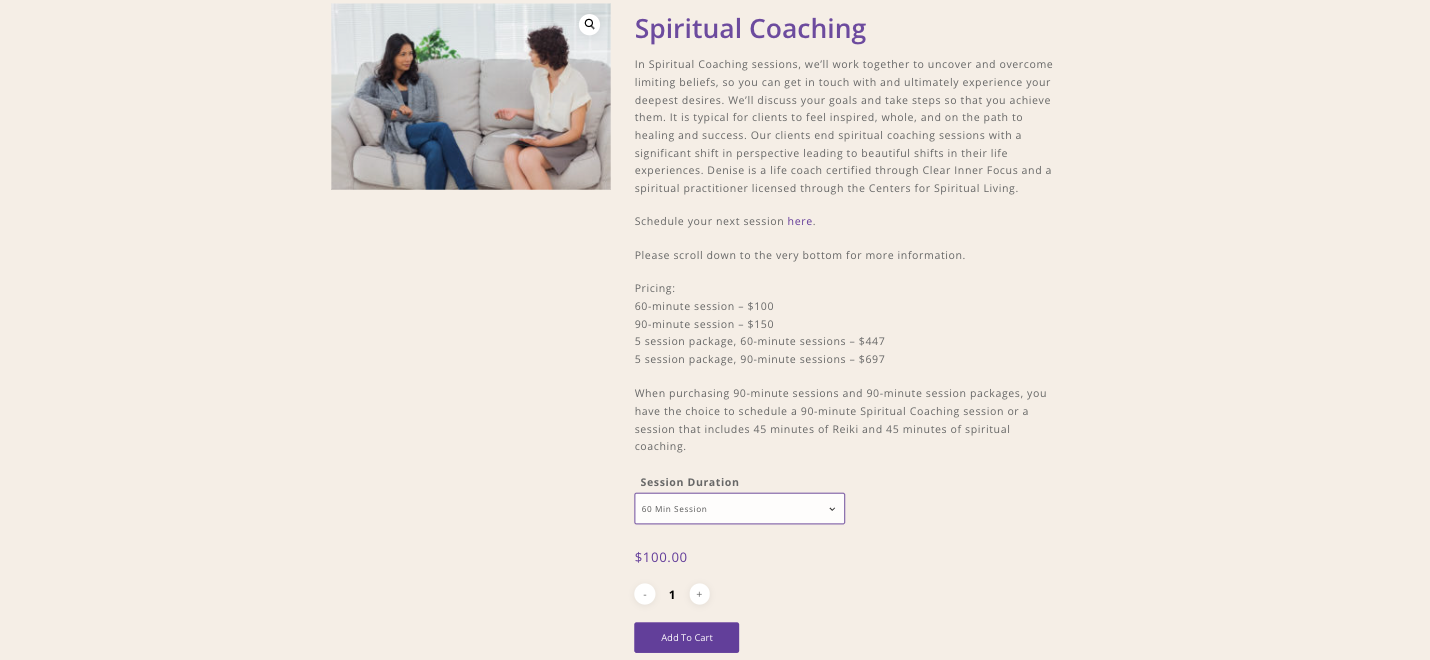
Clients can book you as needed, but a structured package usually provides deeper change. Packages focus on a specific outcome and often include a set number of sessions plus extra support.
For instance, you might include in-between chat support, recorded videos, or written worksheets. Packages encourage a long-term commitment, which is vital in spirituality. Real growth happens over time.
Your first package doesn’t need to be perfect. As you coach more people, you’ll discover what they truly want and which words resonate. The goal here is simply to start.

4. Earn a Credential from a Recognized Program
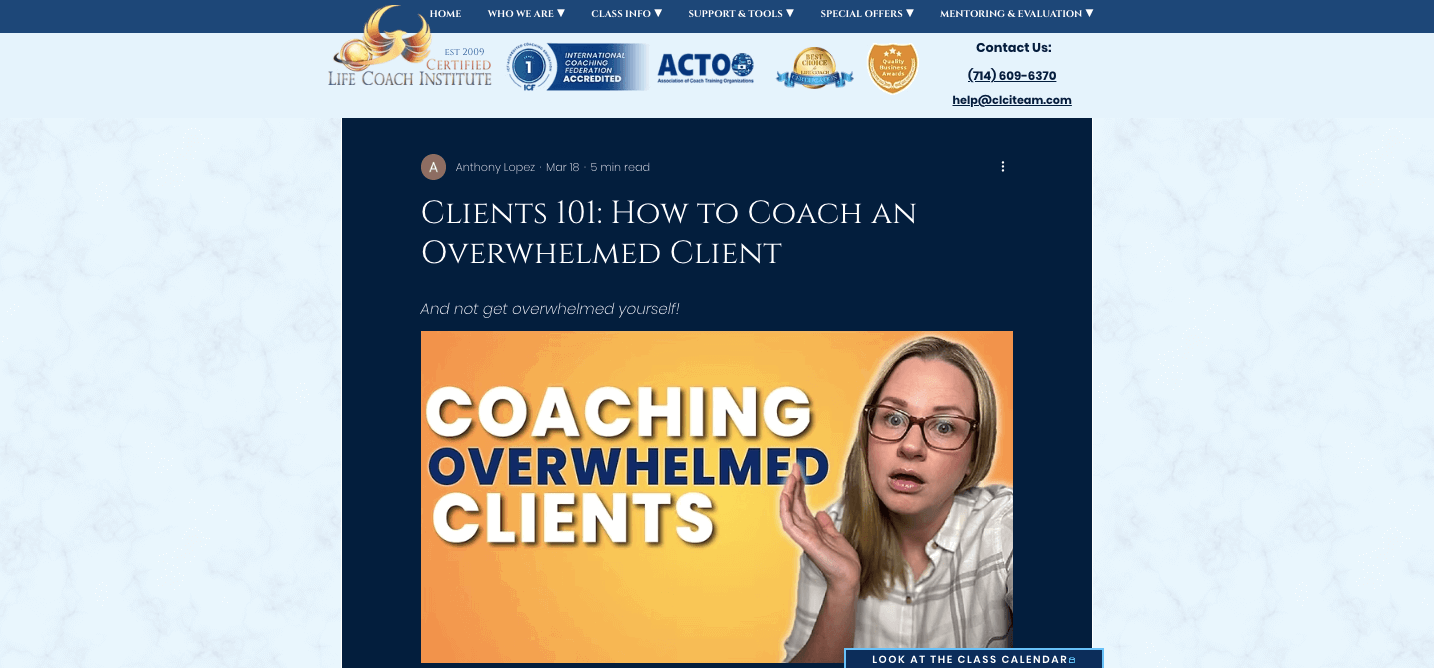
You don’t have to be certified to work as a spiritual coach. This is because the coaching industry isn’t strictly regulated. You can start by offering discounted services to attract your first clients and gain experience.
Even so, you can increase your course credibility by getting certified by a respected program. Being able to show a certificate sets you apart and signals that you have formal training in this niche.
While it may not guarantee a long list of clients right away, it does add professionalism to your profile. Not all programs are the same, so we recommend you choose an accredited program.
However, you can look into schools like Natural Wellness Academy, Certified Life Coach Institute, or Life Purpose Institute. You may also find courses on e-learning platforms such as Udemy, where some certificate programs last a few weeks, and others extend for months.
5. Choose a Platform for Your Services
After deciding whether to get certified, you’ll need to set up the structure for your spiritual coaching sessions. If you plan to serve clients online, you should choose a platform that covers appointment booking, payment processing, and secure client data storage.
Platforms like EzyCourse offer features for hosting courses, scheduling calls, booking appointments, hosting video meetings, and storing data in the cloud. This platform can also help you process payments and manage emails to nurture new leads. So, you can easily create your spiritual online courses with EzyCourse.

Whenever you are using a coaching platform like EzyCourse, you will get an easy-to-use drag-and-drop website builder to build your web presence. Your social media presence is vital, too, so make pages on LinkedIn, Instagram, Facebook, or anywhere your target audience gathers.

6. Appeal to Your Ideal Clients

To run a successful spiritual coaching practice, you’ll need to figure out who your best clients are and how to attract them. Spiritual coaches can assist many different groups, such as:
Business leaders
Homemakers
Women in STEM
Single men aged 30–40
Veterans
Seniors
While you can keep your services broad, choosing one or two groups to focus on often makes branding and marketing easier. A clear target means a clear message, which helps you reach your goals faster.
Next, think of ways to bring in clients. You can:
Tap your existing network
Write guest posts or appear on podcasts.
Use email marketing to easily convert active leads into paying clients.
Build connections on social channels.
Visit related events or conferences.
You must stay consistent with your efforts. It takes time to build trust and secure bookings. Focus on a few approaches first to avoid burnout and keep your momentum steady.
7. Communicate with Clarity
Prospective clients want to know what your coaching can do for them. They may be searching for peace, meaning, or a sense of direction. Because spiritual growth is intangible, you have to explain the change they might experience from your sessions.
Think of the journey you’re offering:
How will you meet them?
Where will they be when you finish?
For instance, someone may go from feeling stuck to feeling free or from doubtful to hopeful. Use examples like these to show clear before-and-after states.
When you define these outcomes, it’s easier to structure your coaching sessions. You can also decide on a timeline that fits the changes you aim to deliver. Clear promises set mutual expectations and increase trust. Clients who see real improvement may refer friends and family, which builds your reputation and helps your business grow.
8. Decide Your Course Price
If you plan to earn income rather than volunteer, you’ll need to settle on pricing. You can charge by the hour or bundle your services into coaching packages. Many coaches prefer packages because this approach offers a predictable income and provides enough time for tangible results.
For instance, you might create a three-month program to guide a client toward deeper self-awareness. They can renew if they need more sessions or decide to upgrade to a higher tier if they see real value.
When setting fees, research your market. Coaches who work with corporate leaders might charge over a thousand dollars for a multi-session package, while those serving retirees might use more modest rates. Balance what others charge with the specific value you bring.
9. Expand Your Network
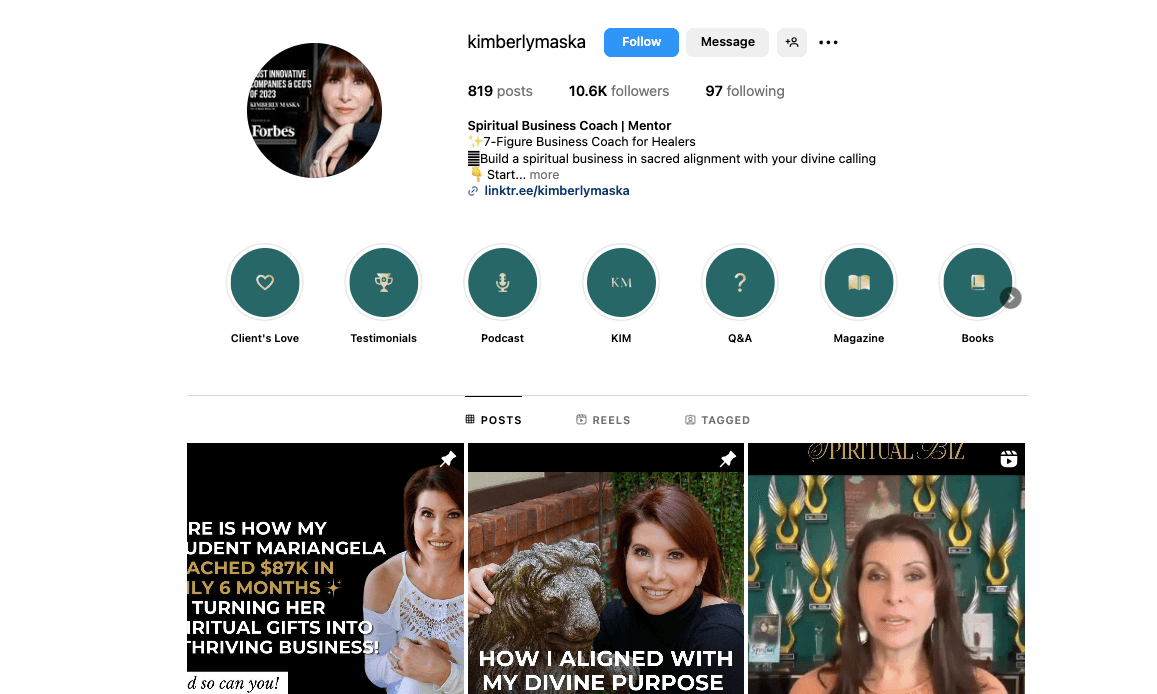
As you help current clients reach spiritual clarity, you still need to find new people who need your coaching. Ongoing outreach ensures steady growth.
Go to events where your ideal clients might gather and share your business card. Build relationships on LinkedIn or other online platforms to meet potential clients. Team up with people in related fields for joint podcast episodes or social media collaborations.
Keep posting free, helpful content on your website and social media to reach more viewers. As more people engage with your content, your email list and referral network will grow. Consistent visibility leads to greater trust and more sign-ups.
That’s how you can become a spiritual coach and launch your own coaching practice.

How to Become a Certified Spiritual Coach?
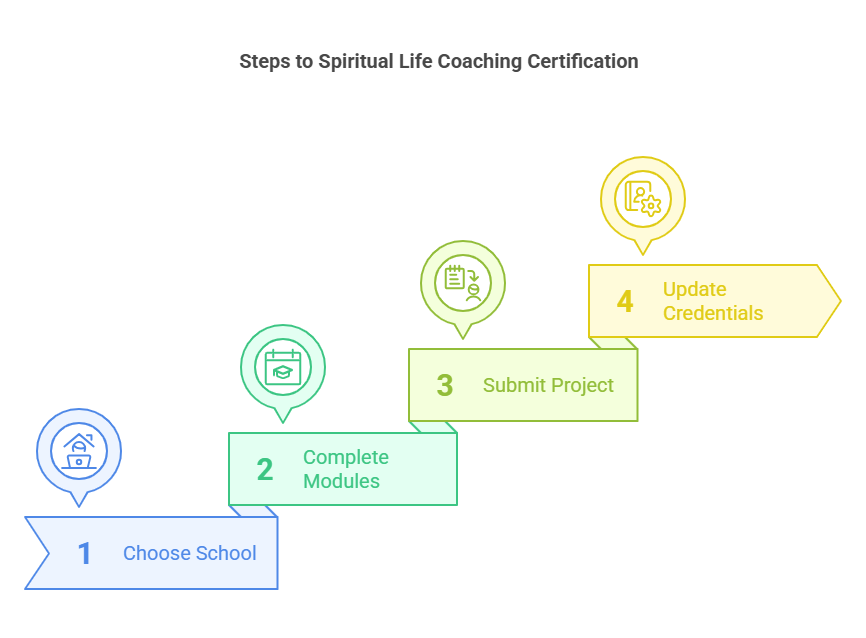
There are many ways to learn coaching tools and techniques. Certification isn’t mandatory because spiritual coaching isn’t regulated.
However, many spiritual coaches decide to get certified for added credibility or to level up their client results. The typical process involves:
Choosing a respected spiritual coaching school.
Completing the required modules, which may last from a few weeks to a year or more.
Submitting a final application or project.
Mention your new credentials and profiles on your site.
Certain spiritual coaching programs have yearly enrollment periods, similar to a university calendar. If you want to join soon, be sure to mark those dates.
Some well-known certification paths include the World Coach Institute, the Psychosynthesis Life Coach & Leadership Certification, and the Center for Transformational Coaching. You should pick one that fits your focus and personal style.
The Essential Spiritual Coaching Methods
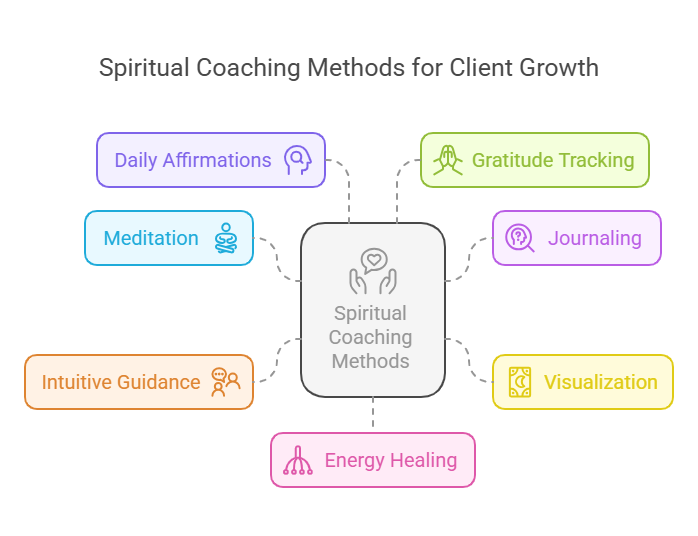
If you plan to start a spiritual coaching practice, you can use these methods to help clients find more profound meaning:
Meditation helps calm the mind, lower stress, and build awareness of the present moment. Clients become more aware of their own spirits.
Journaling lets clients write thoughts and feelings. They don’t need special writing skills. This practice reveals hidden truths about who they are.
Visualization encourages clients to imagine a goal or outcome as if it’s real right now. It taps into their creativity and inner wisdom.
Intuitive guidance uses your inner insight to spot and address spiritual blocks. This allows you to guide your clients through challenges.
Daily affirmations involve short, positive phrases repeated each day, like “I am strong.” These help clients replace limiting thoughts with self-belief.
Gratitude tracking focuses on noting what clients appreciate. This builds a sense of peace and acceptance of life events.
Energy healing aims to clear blocked energy fields. You may learn Reiki or another system to help clients align their inner energy.
Feel free to combine these methods in your sessions. Each one can aid your clients in finding spiritual growth.
What You Will Learn From A Spiritual Coaching Course?
You can learn the following things from a spiritual coach:
Transform your personal life while learning practical steps. Become a strong and successful Spiritual Life Coach.
Develop vital parts of yourself to find balance. Use this proven system to guide clients toward true change.
Discover your special gifts and lead with clarity. Know your worth and direct your purpose with confidence.
Name, shape, and present a Signature Coaching Program. Offer clients a clear path to deep transformation.
Setup key business logistics for growth and freedom. Focus on what matters and build a stable practice.
Go beyond standard talk by tapping into intuition. Connect with clients on a deeper level that sparks real shifts.
Price your services for a steady income and a free lifestyle. Maintain a thriving spiritual coaching career.
How Much Does A Spiritual Coach Can Make?
There are many types of spiritual coaches. You could focus on energy healing, Reiki, or coaching for people who follow a certain religion. Your choice depends on your own skills and experience.
First, let’s see how much you can earn. This industry is booming, so there’s demand for your services. On average, coaches make around $86,500 a year, but you can make more. Some coaches even earn six figures while working fewer hours than they did in a regular job.
One way to start is to charge $1,500 for a three-month package. After you land a few clients, you can raise your rate to $2,000 or more. Getting four to six clients a month can bring you to six figures a year. That’s not so daunting when you look at it in chunks, right?
You should focus on smart marketing to attract a steady flow of clients. As you build your reputation, it becomes easier to keep your business running strong. Eventually, you’ll have a reliable pipeline of people booking calls and signing up for your programs.
Which Path: Spiritual, Religious, Or Life Coaching?
Some people confuse spiritual coaches with religious figures. However, spiritual coaches focus on living fully in this life, while religious leaders often prepare followers for the afterlife.
It’s also easy to compare spiritual coaches to life coaches since both aim to improve lives. Yet spiritual coaches take it a step further by targeting the emotional blocks that prevent inner harmony.
In essence, spiritual life coaching is part of the larger coaching world. It centers on self-discovery and spiritual well-being.
Is Spirituality the Same as Religion?
A spiritual life coach shows people how they connect with the greater universe. This guide offers a fresh view of life and the energy all around us. Using many healing approaches, a spiritual coach helps clients trust themselves and treat others with kindness.
Folks look for spiritual coaches for different reasons. Some want to break negative self-talk or find a more upbeat mindset. Others need help discovering their true purpose, facing hidden blocks, or diving deeper into their spiritual side.
Some clients also want to learn to trust their intuition, heal old wounds, or move through tough times in life. Many ask if spirituality matches religion. It doesn’t. Religion has set rules and beliefs.
Spirituality focuses on the feeling that we’re part of something bigger than our own selves. By honoring this bond, people often grow in empathy, compassion, and self-awareness. A spiritual coach respects each client’s beliefs and recognizes that every person’s path is unique.
Is Spiritual Coaching Business Suitable for You?
Find out if spiritual coaching suits you. Though spiritual life coaching can be an excellent fit for many, it isn’t for everyone. The most effective spiritual coaches have worked on their own sense of connection to a more significant force.
They aren’t perfect, but they’ve reached a degree of balance in their own spiritual journey. If you believe coaching may be your calling, start by exploring your personal spirituality. That way, you can speak to your future clients with honesty. Then, ask yourself:
Do you love to help others reach their goals?
Are you eager to support them along the way?
Can you honor the unique spiritual beliefs of each person?
Do you listen to your own inner guidance?
Are you drawn to a career with flexibility?
Will you work hard for both your clients and yourself?
Are you hoping for a career that can pay well?
If you said “yes” to most of these, then the spiritual coaching business is for you.

Frequently Asked Questions
How Long Does It Take to Become a Spiritual Coach?
There’s no set timeline. If you skip certification, you can begin accepting paid clients right away. If you enroll in a training program, it may take a few weeks or months, depending on the course.
Do Spiritual Coaches Make Money?
Yes, definitely a spiritual coach can make money. Coaches charge their comfortable and worthy prices for providing guidance.
What type of life coach is most in demand?
The most profitable life coaching business niches are:
Business & entrepreneurship
Career
Health and Fitness
Relationship
Anxiety coach
ADHD coach
Conclusion
So, now you know how to become a spiritual coach.
Becoming a spiritual coach requires planning, but it’s entirely doable. First, think about getting a certificate from an accredited school. It’s not needed, yet it can increase your credibility with new clients.
Next, choose a platform for your coaching business. Look for tools that provide scheduling, video calls, and other must-haves. Then, attract the right people and be clear about the benefits you offer.
Once these pieces are set, decide how to price your services and build your network. Bundling sessions into packages often works better than charging by the hour. Meeting new folks helps more potential clients discover you.
Follow these steps, and you’ll be on track for success as a spiritual coach.






